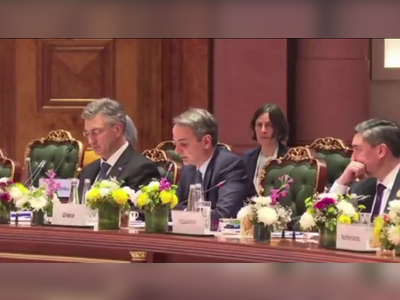Trump administration drops plan to deport foreign students taking online-only classes amid coronavirus pandemic
The US government has rescinded a directive that would have stripped visas from thousands of international students whose courses are offered online only, it was announced on Tuesday, ending a week-long stand-off between American academia and President Donald Trump’s administration.
The move came after dozens of universities, tech firms and US states joined Harvard University and the Massachusetts Institute of Technology in trying to block the new policy.
“I have been informed by the parties that they have come to a resolution of the combined … preliminary injunction motion,” Judge Allison Burroughs of the Massachusetts District Court said in a hearing that lasted about two minutes.
Guidance for international students “will return to the status quo as established by the March 9, 2020, policy directive … and will preclude the enforcement of the July 2020 policy directive and frequently asked questions on a nationwide basis,” she said.
On July 6, the US Department of Homeland Security (DHS) and its Immigration and Customs Enforcement (ICE) division announced its intention to rescind the right of international students to remain in the US while taking online-only courses – an allowance granted in March in response to the coronavirus pandemic – although the agency had not published the change ahead of Tuesday’s hearing.
ICE signalled the rule change as many universities, including Harvard and MIT, announced plans to keep their courses online only because of health concerns. ICE had given universities offering remote instruction only nine days, until Wednesday, to register “operational change plans”.
Schools offering a hybrid of online and in-person instruction would have had to issue certifications by August 4 for each international student remaining in the US for such a curriculum to guarantee they are taking the minimum number of in-person courses.
“Despite the administration’s claims that it had lawful discretionary powers to end student visas for those attending online courses this fall, it has rescinded those guidelines with as much advanced notice as when it announced it,” said Diane Hernandez, an immigration lawyer at the firm of Hall Estill.
“The administration was likely motivated to rescind the policy, either by the huge number of new lawsuits it faced from several universities and state institutions, or due to the idea that implementing such a measure in an already tumultuous election year could be detrimental to the president’s re-election efforts,” she added.
In legal briefs filed to Burroughs before the hearing, Harvard and MIT argued that ICE’s move was “capricious” because its main intent was to force schools to reopen, and that it violated a law meant to protect businesses from arbitrary decisions that could adversely affect business operations.
“Today’s action demonstrates the importance of international students to the United States and shows that together with one voice, all of higher education, the business community and many others across our nation are making it clear that these students continue to be welcome here,” Ted Mitchell, president of the American Council on Education, said shortly after the hearing.
“We are enormously gratified that Harvard University and MIT, as well as many states and other colleges and universities, took immediate legal action to force the Trump administration to rescind its wrong-headed directive that would have prevented students attending US institutions operating online during this global pandemic from remaining in or coming to our country.”
The disruption the directive would have caused – not only for international students, but also for communities where they spend on housing and other expenses – prompted a deluge of amicus briefs and additional lawsuits assailing ICE for trying to force schools to open classrooms while coronavirus cases in the US continue to rise.
“In-person instruction offered only for the purposes of meeting this arbitrary directive risks sacrificing the health and safety of students, faculty and staff – and, indeed, our states more generally,” Massachusetts Attorney General Maura Healey said in a complaint filed on behalf of her state, 17 other US states and the District of Columbia.
“Losing the presence – and in many cases the enrollment – of international students would result in the loss of invaluable perspectives and contributions by these students, hundreds of millions of dollars in foregone tuition as well as fees for housing and other services, and hundreds of billions of dollars in revenue for our states’ economies,” Healey said.
Trump, along with US Secretary of Education Betsy DeVos, has been pushing for the reopening of schools at all levels as a way to counter the economic turmoil and unemployment caused when most states enacted social distancing rules to slow the spread of Covid-19.
Many of those states, including California and Florida, are now reversing their reopening plans – closing restaurants, cinemas and fitness clubs – as infection numbers rise.
The federal government’s defence team, led by US Attorney Andrew Lelling, contended in their pre-hearing briefs that ICE had warned that the March allowance was subject to change and was not subject to the Administrative Procedure Act, which calls for public participation in the formulation of government agency rules.
Some 44 per cent of US universities and other post-secondary educational institutions are planning to be fully online, offering a hybrid model or have not yet decided how they will run the upcoming academic year, according to The Chronicle of Higher Education.
Still, the government’s decision to backtrack on ICE’s directive may have come too late to avoid headaches for some students.
“Harvard, MIT and their students face irreparable injury if the directive is not enjoined,” William Lee, one of the lawyers representing the schools, said in a brief filed a few hours before Tuesday’s hearing. “Indeed, they face such injury right now: the government is enforcing the directive at airports and consulates across the world, turning students away because they attend universities that have made the considered decision to offer instruction online this fall.”
An amicus – or “friend of the court” – brief filed on Monday by 59 universities on behalf of Harvard and MIT’s complaint detailed some of these instances.
“On July 8, 2020, a DePaul University student returning from South Korea was prevented from entering the country at the San Francisco airport on the ground that he had not yet registered for classes – and thus could not establish that at least some of his coursework would be in-person,” the court document said.
“Amici have received reports of other students who likewise have been told they will be unable to obtain visas until their schools comply with the July 6 directive,” it added. “Accordingly, nationwide relief is needed now.”
Rice University President David Leebron agreed, telling CNN as news of the legal settlement broke that the ICE move was “cruel”.
“We thought the original rules that were suggested were cruel and misguided and didn't serve our universities, didn’t serve our students and frankly didn’t serve our country,” he said.
Esther Brimmer, executive director of NAFSA: Association of International Educators, said uncertainty created by the ICE’s moves means the US government will need to work to revive confidence among students that they are welcome in the United States.
Last week’s ICE directive “put university administrators in the position of weighing the deportation of valued members of their campus community against the public health risks of holding in-person classes. We are heartened to see the guidance put to rest”.
“While this is a positive outcome, we cannot ignore the damage inflicted by the perception of the July 6 guidance – the administration was willing, until this guidance was rescinded, to force international students to choose between maintaining legal immigration status and what is best for their health and safety,” she said.














